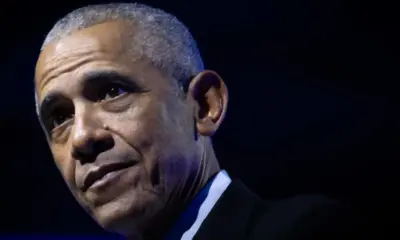Politics
Pritzker Opposes Johnson’s Corporate Head Tax in Budget Debate

Illinois Governor JB Pritzker has publicly expressed his opposition to a significant element of Chicago Mayor Brandon Johnson‘s proposed budget for 2026. During a discussion at the Economic Club of Chicago on Tuesday, Pritzker stated, “I am absolutely four-square opposed to a head tax in the city of Chicago.” This head tax, referred to by Johnson as a community safety surcharge, imposes a fee of $21 per employee per month on large corporations with at least 100 employees operating within city limits.
Johnson’s plan to reinstate the head tax, which was eliminated by former Mayor Rahm Emanuel in 2014, has faced considerable skepticism since its introduction. The governor’s disapproval adds to the challenges the mayor faces in garnering support for this tax initiative. Johnson argues that his budget proposal aims to avoid increasing taxes on “working people,” instead placing the burden on what he describes as the “ultra-rich.”
In his remarks, Pritzker emphasized that the head tax contradicts his economic objectives for the city. He noted, “It penalizes the very thing that we want, which is more employment in the city of Chicago. It makes it very hard to attract companies from outside of Chicago to come in and harder for companies that are in Chicago to stay.”
As the debate unfolds, the Chicago City Council has commenced budget hearings, with members required to approve a balanced budget by December 31. During a press conference on Tuesday, allies of the mayor, including child care workers represented by SEIU Healthcare Illinois, voiced their support for the proposed budget. Alderman Jeanette Taylor from Ward 20 criticized perceived wastefulness in the city’s budget, asserting, “We should make sure the people are the priority.”
Child care advocates have gone even further than Johnson’s proposal, advocating for a corporate head tax of $40 per employee per month. They propose that the additional revenue be allocated to enhance child care access and provide workers with a $1 hourly wage increase. Toni Frazier, a child care advocate, highlighted the essential role child care workers play in the city’s economy, stating, “We’re the people who make it possible for other Chicagoans to go to work.”
Despite the support from some sectors, several aldermen have voiced strong opposition to the proposed head tax. Anthony Beale, Alderman for the 9th Ward, remarked, “I think the head tax is definitely a job killer. It sends the wrong message… that Chicago is not open for business.” Alderman Matt O’Shea from the 19th Ward expressed concerns about attracting businesses, stating, “As we continue to see more and more companies talking about leaving Chicago and Illinois, this is not the message to send.”
Pritzker reiterated the necessity of balancing the budget while suggesting that the city should focus on identifying “efficiencies” to reduce expenses. He remarked, “I haven’t seen any of that in this budget so far. I think that’s going to have to happen because there are going to be changes.” His comments indicate that there may be challenges ahead in aligning the budget with both the mayor’s proposals and the broader economic priorities for the city.
The ongoing discussions surrounding Chicago’s budget will likely continue to evolve as both city officials and community advocates weigh in on the implications of the proposed head tax and its potential impact on the local economy.
-

 Business7 days ago
Business7 days agoIconic Sand Dollar Social Club Listed for $3 Million in Folly Beach
-

 Politics1 week ago
Politics1 week agoAfghan Refugee Detained by ICE After Asylum Hearing in New York
-

 Health1 week ago
Health1 week agoPeptilogics Secures $78 Million to Combat Prosthetic Joint Infections
-

 Science7 days ago
Science7 days agoResearchers Achieve Fastest Genome Sequencing in Under Four Hours
-

 Lifestyle1 week ago
Lifestyle1 week agoJump for Good: San Clemente Pier Fundraiser Allows Legal Leaps
-

 Health1 week ago
Health1 week agoResearcher Uncovers Zika Virus Pathway to Placenta Using Nanotubes
-

 World1 week ago
World1 week agoUS Passport Ranks Drop Out of Top 10 for First Time Ever
-

 World1 week ago
World1 week agoRegional Pilots’ Salaries Surge to Six Figures in 2025
-

 Science1 week ago
Science1 week agoMars Observed: Detailed Imaging Reveals Dust Avalanche Dynamics
-

 Entertainment1 week ago
Entertainment1 week agoJennifer Lopez Addresses A-Rod Split in Candid Interview
-

 Top Stories6 days ago
Top Stories6 days agoChicago Symphony Orchestra Dazzles with Berlioz Under Mäkelä
-

 World1 week ago
World1 week agoObama Foundation Highlights Challenges in Hungary and Poland









